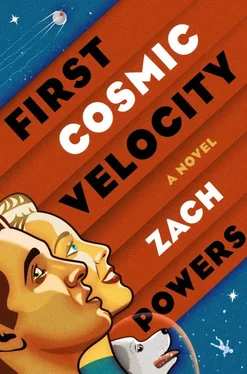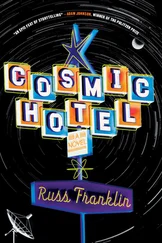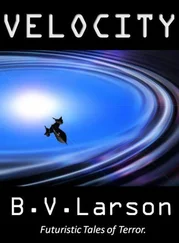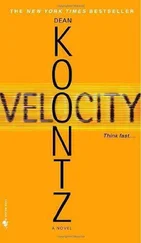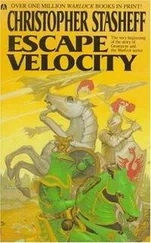Now he stood, looming over the control panel like the rocket over the pad, both figures, to look at them, unlikely to ever leave the ground. His finger floated above the ignition button. Could he press it again? After the first launch, he had always pressed it himself. Whoever’s finger did the work, though, the ultimate responsibility was his. It was his button, his rocket, his cosmonaut. No, he would not press it again. He would remove his hand, scrub the mission. He would stand on the scaffold of the launchpad as Leonid emerged from Vostok. He would welcome Leonid home like a son, though Leonid had never actually left the ground. Like Nadya. Like the Nadya who survived. What had her sister’s hair looked like in space?
“We never think to ask the right questions,” he said.
The Chief Designer mouthed the final numbers of the countdown: pyat , chetirii , trii , dva , odin .
He pushed the button, and the engines, all twenty of them, lit as one.
• • •
LEONID WATCHED HIMSELF launch into space. A small spark flashed at the base of the R-7, and then it grew, flaring so bright that the rocket itself was swallowed up. He worried something was wrong. Even though he had seen four previous launches, the fireball seemed impossible to survive, the rocket a matchstick igniting the sun.
He felt the rumble coming even before it rattled the bunker. It knocked him off balance. At breakfast that morning he’d only managed two bites of black bread. His brother, his other self, had eaten everything else. That was the first time they had seen each other in months, one of only a few times over the years. They had always trained separately, always pretending to be one and the same person. Leonid’s brother did most of the real training, this Leonid learning just enough to appear capable, his main job to wait, to stay invisible until such a time as he was needed. Until today. Neither brother had spoken a word the whole meal. Now Leonid’s breakfast would leave the very planet it came from.
The trusswork petals around the rocket separated and then fell back, a bloom of metal and flame. At first by fingerbreadths and then meters the rocket rose, and then it ate up sky, leaving whole lengths of itself behind as smoke. Leonid thought of a gray thread stitching blue fabric. The thread grew finer as the rocket drew away, until all he could see was a distant orange glow, fading in and out behind wispy clouds. The glow faded a final time and never returned to view.
The smoke trail thinned, feathering at the edges, and took up position in the sky as a narrow cloud. A tether without substance, carried across the steppe by the dry, hot wind.
Through the slitted window, Leonid could see the other bunker, the control room, about half a kilometer up the main road. The bunker looked like an anthill from afar, just a bump rising out of the dirt. All the other twins were there now, manning the controls, or like Nadya, just watching. Leonid was the last twin, and so this bunker was his alone. The other cots would remain empty. He’d spend the three days of the mission sleeping, eating the premade meals, and staring out the window at the unchanging scenery. He noted the clouds on the horizon. The storm would soon turn the complex into an edgeless field of muck, but he was grateful for the rain. It was the only movement he would be able to see through the window.
His eyes followed the smoke trail up to the vanishing point. He spoke his brother’s real name, the one given by their parents, not the one the two of them now shared. Leonid knew that secret name, as did the Chief Designer, and of course Tsiolkovski. No one else, though. Not since Grandmother said goodbye and they boarded the train and Tsiolkovski spoke to them for the first time: “From now on, you are one boy, the same boy. Your only name is Leonid.”
All of a sudden, that first statement was true. Leonid, in his tiny bunker with its crack of a window and uncomfortable cot, was the only Leonid on Earth. The bottom of the smoke trail lifted, breaking contact with the ground.
• • •
ENGINEERS SCURRIED AROUND the control room, giddy, always about to bump into each other but somehow never colliding. Molecules in a gaseous state, thought the Chief Designer. It was always like this after a successful launch, especially one with a cosmonaut on board. The tension of waiting was replaced with euphoric release. The technicians made short work of the post-launch checklist. Systems were shut down, valves secured, inspections made. One by one, the indicator lights on each control panel darkened. Mishin and Bushuyev gathered the fifteen thick volumes of technical data on the R-7, barely able to hold half each in their arms, and carried the books out to the Chief Designer’s black Volga sedan. The driver offered to help load the volumes, but Mishin and Bushuyev declined. Sometimes it seemed as if they always had the books wrapped in their embrace.
The last person to leave the bunker, besides the Chief Designer himself, was Mars. Azerbaijani by birth, Mars’s personal history had of course been rewritten to make him a proud son of Leningrad. He and his twin had quickly learned the accent, the local customs. Though they did not exactly look the part, no one had ever questioned their heritage. Mishin and Bushuyev took the Mars twins, one at a time, on tours of the city, but the Marses themselves ended up serving as guides. Through their studies, they had learned Leningrad better than even lifelong residents, navigating the streets without hesitation. That was how they trained, too. The Chief Designer recalled the simple assurance with which the other Mars would flip a switch. It seemed like such a small thing, a toggle of mere millimeters, but Mars had mastered that tiny gesture in a way the other cosmonauts never would. This Mars had shown the same confidence as his brother in the simulator, though he had spent far less time inside it. It pained the Chief Designer to see how much that confidence had been purged from him.
Mars leaned over the communications console, speaking in whispers to Leonid as Vostok 5 settled into its orbit. Mars would stay there, mouth held millimeters from the microphone, until the capsule rounded the horizon and communications were handed off to other stations—Makat, Sary-Shagan, Yeniseysk, Iskhup, Yelizovo, Klyuchi, Moscow, Leningrad, Simferopol, Tbilisi, Kolpashevo, Ulan-Ude, Sibir, Suchan, Sakhalin, Chukotka, Dolinsk, Ilyichevsk, Krasnodar—where strangers would carry on impersonal conversations with Leonid, more concerned with inserting data into tables than speaking to the lonely cosmonaut. When the launch crew arrived back in Star City, Mars would head directly to the communications room, where he would remain for the duration of the mission, as he had done for every mission after the second, when his own twin had launched. Back when they still hoped to bring the twins home. More than once, the Chief Designer had thought he heard Mars’s low voice ask, “Do you see him?” Mars’s brother, though, had burned up on reentry. There was nothing left to see.
“Mars,” said the Chief Designer, “it’s time to go. We must make it to the plane before that storm arrives.” He pointed through the wall in the direction of the approaching thunderhead.
Already the speaker fed back only static. Mars flipped several switches and silenced it. He had developed a hunch to his shoulders, as if he were always leaning down to speak into the microphone. His hair, thick and black, he kept cropped so close that scalp showed through. He often forgot to shave, his beard growing in far longer than his hair. Mars stood and left, snatching his cap from a hook by the door.
The Chief Designer took a final look around the bunker. Everything was off that was supposed to be off. He tucked chairs under the console. He picked up and pocketed a pencil someone had left behind. As tidy, he thought, as the inside of a concrete block could be. He turned to leave.
Читать дальше
